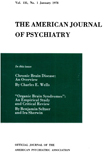AN APPRAISAL OF THE PERSONALITY TYPES OF THE ADDICT
Abstract
An attempt has been made to discuss addicts from the standpoint of types set up on the basis of manifestations of personality. It must be remembered, however, that any classification is of value only if it leads to better understanding the patient, which is essential to intelligent therapy. Indefinite or overlapping groupings not only serve no useful purpose, but may obstruct proper therapy. There is a danger in too much insistence on classification, since there is then a tendency to think of addicts in terms of groups or constellations rather than as individuals with individual personalities. At best the personalities of addicts in the same category are only similar; rarely can sweeping statements as to therapy be made on the basis of such groupings. The groups shade into one another and there will always be difficulty in classifying the borderline cases. This should cause us little concern from the therapeutic point of view since the patient should be treated according to the individual findings in any event. Finally, it should be noted that the personality types discussed are not peculiar to addicts alone. Except for normal individuals accidentally addicted, patients who have never used drugs can be found in any psychiatric clinic who would certainly fall into one or the other of the classes enumerated. The addict is not a creature apart from the psychiatric point of view. He differs from other psychiatric cases of the same class chiefly in his presenting symptom. The therapist must ever keep this fact before him, and treatment should be directed accordingly. This must be the first rule in treating the addict.
Access content
To read the fulltext, please use one of the options below to sign in or purchase access.- Personal login
- Institutional Login
- Sign in via OpenAthens
- Register for access
-
Please login/register if you wish to pair your device and check access availability.
Not a subscriber?
PsychiatryOnline subscription options offer access to the DSM-5 library, books, journals, CME, and patient resources. This all-in-one virtual library provides psychiatrists and mental health professionals with key resources for diagnosis, treatment, research, and professional development.
Need more help? PsychiatryOnline Customer Service may be reached by emailing [email protected] or by calling 800-368-5777 (in the U.S.) or 703-907-7322 (outside the U.S.).



